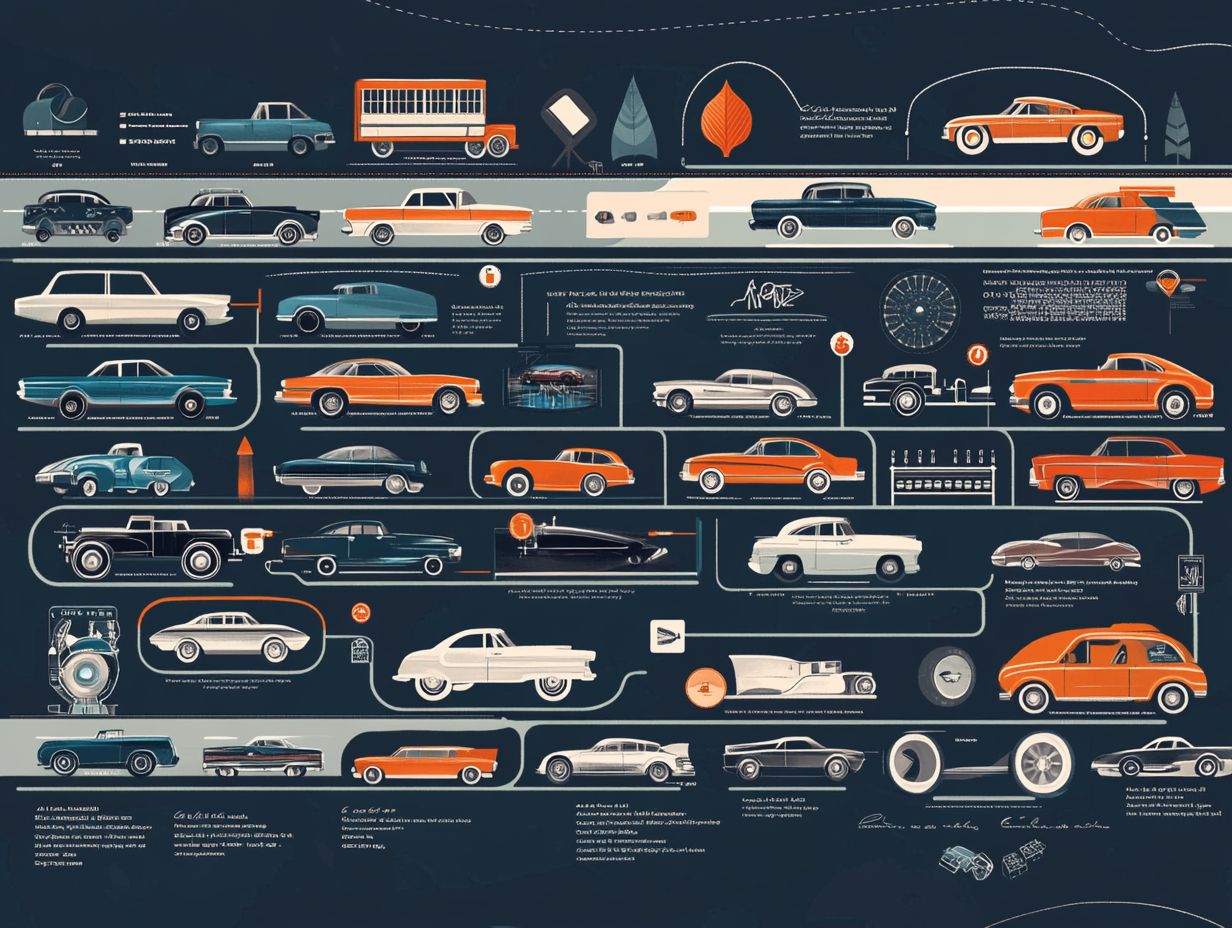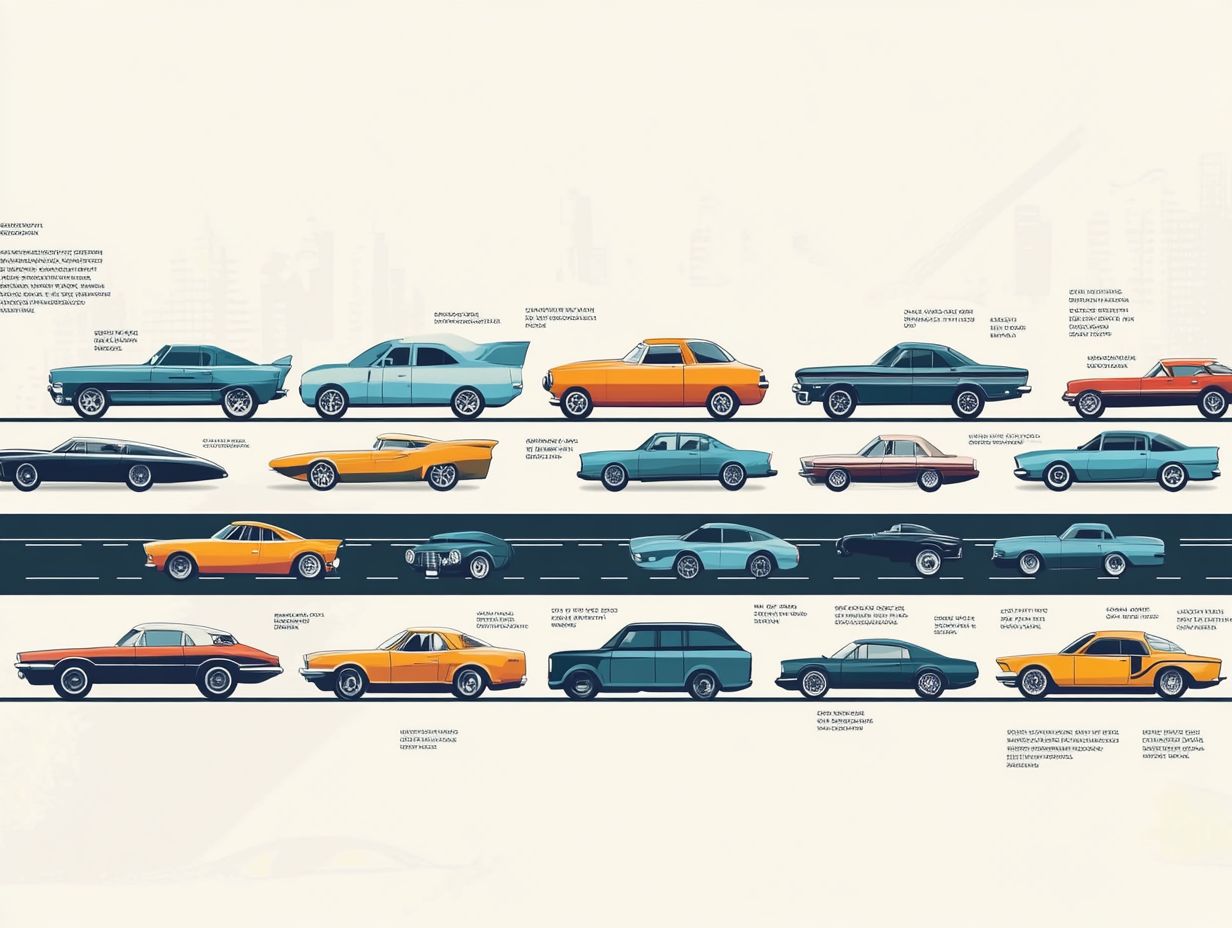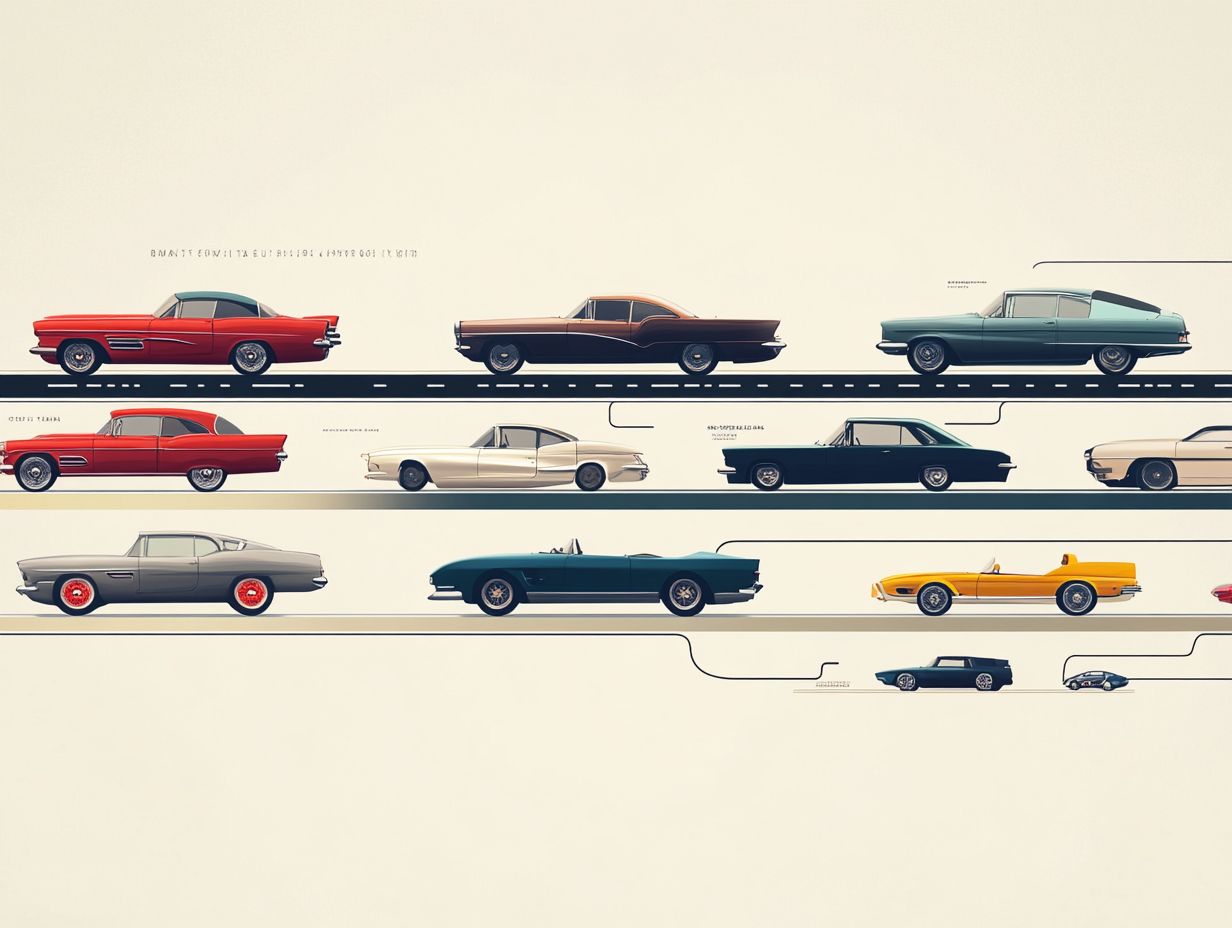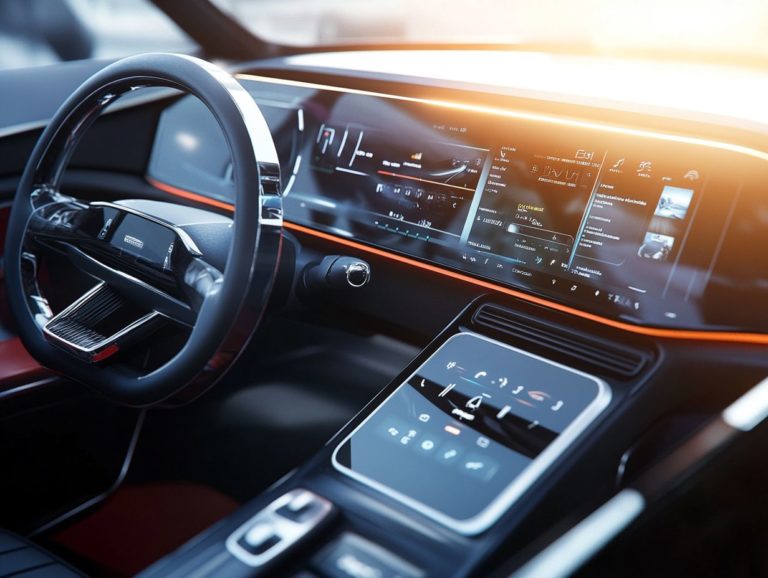Buying New Cars: A Timeline
Considering a new car? It s an exhilarating journey filled with choices, yet it can also feel a bit daunting. From researching various models to grasping financing options, each step is vital in making the right decision for yourself. This guide will help you navigate the thrilling timeline of buying a car!
Whether you re eyeing your dream car or simply exploring the possibilities, this article is designed to simplify the process and empower you to drive away with confidence.
Contents
- Key Takeaways:
- Why Buy a New Car?
- Pre-Purchase Timeline
- Negotiating and Financing
- Post-Purchase Timeline
- Long-Term Considerations
- Frequently Asked Questions
- What is the recommended timeline for buying a new car?
- When should I start saving for a new car purchase?
- How to Budget for Your New Car
- Is it better to buy a new car at the beginning or end of the year?
- When is the best time to negotiate the price of a new car?
- What factors should I consider when choosing between buying or leasing a new car?
Key Takeaways:

- Do your research and set a budget before starting the car buying process to ensure you make an informed decision and avoid overspending.
- Test drive and compare different car models to find the best fit for your needs and preferences before negotiating and finalizing the purchase.
- Register and insure your new car promptly, and stay on top of maintenance to protect your investment and maximize its resale value in the future.
Why Buy a New Car?
Purchasing a new car can be an exhilarating journey, opening up exciting possibilities tailored to your needs, whether you’re after fuel efficiency for your daily commute or advanced safety features for family adventures. To make the most of your purchase, it’s important to know the best times to buy a new car.
Unlike their used counterparts, new cars come equipped with the latest technology, enhanced reliability, and a comprehensive warranty that offers you peace of mind throughout your ownership.
Buying a new car lets you explore many models, assess your must-have features, and understand the total cost of ownership. This includes not just the purchase price, but also how much you’ll spend on insurance, maintenance, and fuel. For a thorough understanding of the new car buying process, this meticulous approach to car shopping empowers you to make an informed decision that aligns seamlessly with your personal finance aspirations.
Pre-Purchase Timeline
The pre-purchase timeline is an essential stage in your car-buying journey, laying the groundwork for making an informed decision while steering clear of potential missteps. During this phase, it’s important to research thoroughly and follow tips for budgeting when buying new cars to find the best vehicle options suited to your needs.
Take time to evaluate your financial situation, ensuring your budget aligns with your desires. Exploring various financing avenues, such as auto loans and dealer quotes tailored to your circumstances, is key.
By leveraging resources like Consumer Reports, you enable yourself with knowledge about different car models, their features, and prevailing market conditions. This thorough preparation allows you to approach your purchase with confidence and assurance.
Researching and Budgeting
Researching and budgeting are crucial steps in your car-buying journey, ensuring you choose a vehicle that aligns with your needs and financial situation. By utilizing a car payment calculator, you can estimate monthly payments and grasp the total cost of ownership. Remember, it s not only about how much you pay for the car; it includes insurance, maintenance, and fuel costs.
Evaluating your trade-in value may also provide a significant boost to your budget, enabling you to allocate funds more effectively toward your new car. Understanding these aspects allows you to make informed decisions that resonate with your long-term financial goals.
Each car model comes with unique features and potential hidden costs, so carefully weighing your options can save you money in the long run. A comprehensive budget should encompass the total cost of ownership over time, rather than fixating solely on the sticker price.
By thoughtfully evaluating why certain models boast higher reliability ratings or superior fuel efficiency, you can anticipate future expenses and make a purchase that not only feels right today but also stands the test of time financially.
Test Driving and Comparing Models
Test driving cars is a crucial step in your car-buying journey. It allows you to evaluate the performance, comfort, and features of various models firsthand. This hands-on experience helps you pinpoint essential features that align with your lifestyle while comparing the options available in the dealership’s inventory.
When you take a test drive, you also create an opportunity to engage in price negotiations. Use your insights and experiences to secure a more attractive deal.
By exploring each vehicle on the road, you gain a clearer understanding of how well a car meets your needs from handling to technology integration. You ll get to know the car’s specs better. This helps you see how different models compare, which is important when making your final decision.
The informed insights you gather from these test drives give you the power in discussions with sales representatives. This paves the way for more effective price negotiations and potentially more favorable financing options that genuinely reflect the value of the cars you’re considering.
Negotiating and Financing

Ready to snag the best deal on your new car? Let s dive into the world of negotiation! Negotiating and financing play important roles in the car purchasing journey, shaping both the affordability and your satisfaction with the new vehicle.
Mastering the art of price negotiation with dealerships can unlock substantial savings. Come prepared with dealer quotes and thorough market research to gain an edge.
Understanding the available financing options is important. Securing a preapproved car loan equips you to make informed financial choices, safeguarding you from unwelcome surprises during your ownership experience.
Tips for Getting the Best Deal
To secure the best deal while buying a car, adopting a strategic approach is essential. Take your time during negotiations; moving slowly and carefully ensures you don t overlook crucial terms.
Gathering dealer quotes and insights from Consumer Reports can give you a valuable edge. This enables you to compare offers transparently.
Diving into various financing and insurance options ahead of time will better prepare you for discussions, leading to more favorable outcomes.
Thorough research is paramount in this process. Understanding the market value of specific models equips you with information that can significantly influence the conversation.
Getting pre-approved for a loan is a smart move it simplifies your financing strategy and sets a clear budget, giving you the power to negotiate with confidence.
Don’t shy away from asking questions about the total cost of ownership, including maintenance and warranty options. These factors can greatly affect the overall value of your purchase.
By being well-informed and prepared, you position yourself to secure a deal that genuinely aligns with your needs. Act quickly to maximize your savings!
Understanding Financing Options
Understanding your financing options is essential as a car buyer, as it directly affects your monthly payments, loan terms, and overall affordability. Explore various auto loans and payment alternatives, paying close attention to interest rates, which can significantly influence the total cost of ownership over time.
Different lenders present a range of options, from traditional bank loans to online financing solutions, each with unique terms and conditions.
While variable interest rates might catch your eye initially, they can rise unexpectedly, leading to higher payments later on. Shorter loan terms typically result in higher monthly payments but reduce the overall interest paid.
It’s crucial to consider features like prepayment penalties or flexibility in payment schedules, as these factors can significantly shape your purchasing experience.
Ultimately, making informed decisions about auto loans can lead to substantial savings and greater peace of mind.
Post-Purchase Timeline
The post-purchase timeline is an important step that begins the moment you acquire your new vehicle. It includes essential steps such as securing car insurance and completing vehicle registration, as outlined in what to expect when buying a new car.
Ensuring you have the right insurance coverage is essential for protecting your investment. Understanding the costs of ownership, like maintenance and warranties, helps you budget for future expenses.
You also need to learn about the necessary documents and services for a smooth transition into car ownership.
Registering and Insuring Your New Car
Registering and insuring your new car are essential steps that not only protect your investment but also keep you on the right side of the law while cruising the roads. Choosing the right auto insurance is vital! It protects you from potential damages, and understanding registration fees enables you to budget effectively.
This process gives you legal ownership of your vehicle and provides a backup plan for unexpected events, making it a vital part of car ownership.
To kick things off, gather the necessary documents like the vehicle title, proof of identity, and a bill of sale. Once you have these in hand, head over to your local Department of Motor Vehicles (DMV) to complete the registration process and handle any applicable fees.
Regarding insurance, it s important to explore options that cater to your unique needs, such as liability coverage which pays for damage to others if you’re at fault in an accident comprehensive plans, and collision insurance. Compare quotes to uncover great savings and ensure you re properly covered!
Maintaining Your New Car

Maintaining your new car is essential for ensuring its longevity and reliability. This can significantly affect your ownership costs. By understanding your car’s warranty and considering an extended warranty, you can enjoy added peace of mind against unexpected repairs, while routine maintenance keeps your vehicle performing at its best.
When you combine these elements, you can greatly influence the overall expenses tied to keeping your vehicle in prime condition. Regular check-ups and proactive care allow you to identify potential issues early, helping prevent costly repairs down the line.
Knowing the details of what your warranty covers like parts and labor enables you to budget effectively for any service needs. For most owners, this leads to financial savings and a more enjoyable driving experience, as the assurance of reliable performance fuels confidence on every journey.
Long-Term Considerations
When purchasing a vehicle, consider long-term factors like resale value and potential future upgrades that significantly shape your ownership experience.
Evaluate the total cost of ownership, including depreciation, maintenance, and insurance costs elements that can profoundly impact its long-term value.
Moreover, staying informed about the most reliable cars and essential features will guide you in making informed decisions on upgrades or replacements, ensuring your vehicle aligns with your evolving needs.
Ready to hit the road? Let s make sure you re covered!
Resale Value and Future Upgrades
Resale value and future upgrades are important factors that can significantly shape your investment in a vehicle. Understanding the resale value of different car models empowers you, especially when selecting reliable cars that depreciate slowly. This insight enhances your total cost of ownership and ensures you’re making a smart investment.
Planning for future upgrades based on your car’s features can help your vehicle evolve with your needs over time. This consideration affects both the initial purchase price and your long-term satisfaction as an owner. Certain models are known for their reliable performance and tend to command higher resale prices, especially when well-maintained.
By choosing a car recognized for its dependability and strong resale record, you position yourself to benefit from a vehicle that retains its value. This approach allows you to contemplate future enhancements or replacements without facing a significant financial burden.
Choose a vehicle that not only holds its value but also adapts to your needs. This choice sets you up for an exciting ownership journey!
Frequently Asked Questions
What is the recommended timeline for buying a new car?
The recommended timeline for buying a new car varies, but it’s generally best to start researching and shopping at least 3-6 months in advance. This allows you enough time to make an informed decision and find the best deals.
When should I start saving for a new car purchase?
It’s advisable to start saving for a new car as soon as you know you’ll need one. For tips on making the most of your budget, check out this guide on how to prepare for a new car purchase. This gives you more flexibility and options when choosing a car and negotiating prices.
How to Budget for Your New Car
When creating a budget for a new car, consider the cost of the car itself, as well as additional expenses such as taxes, registration fees, insurance, and potential maintenance costs.
Is it better to buy a new car at the beginning or end of the year?
It depends on your personal preference and available deals. Typically, dealerships offer better deals at the end of the year to clear out old inventory, though selection may be limited. Buying at the beginning of the year offers a wider selection but may have fewer discounts.
When is the best time to negotiate the price of a new car?
The best time to negotiate the price of a new car is toward the end of the month or quarter, when dealerships are eager to meet sales quotas. You can also negotiate during holiday sales events or when a new model year is about to be released.
What factors should I consider when choosing between buying or leasing a new car?
When deciding between buying or leasing a new car, consider factors such as your budget, driving habits, and how long you plan to keep the car. Leasing may be better for lower monthly payments and driving a new car every few years, while buying may be the better option if you intend to keep the car long-term.







